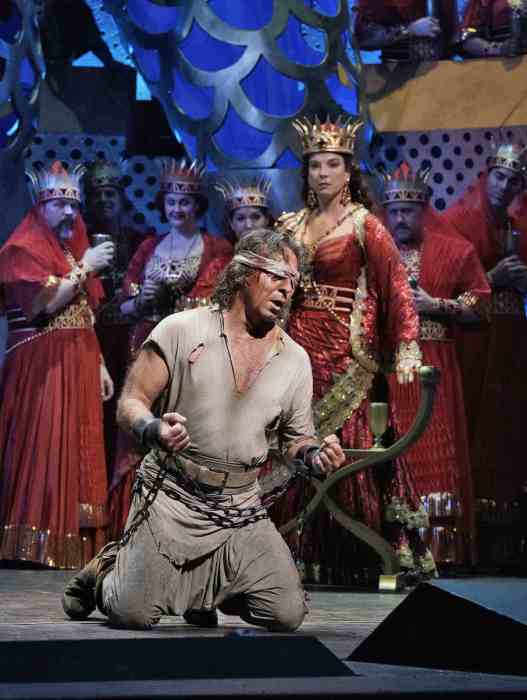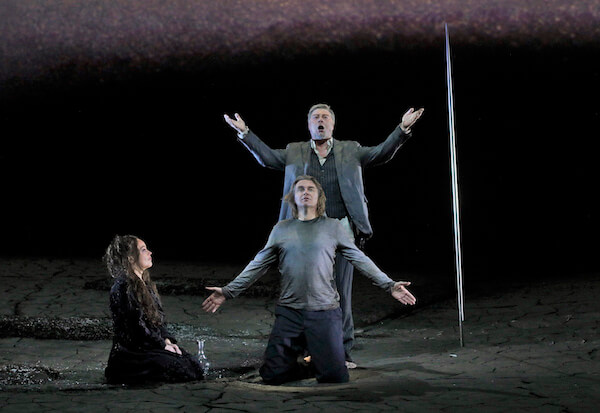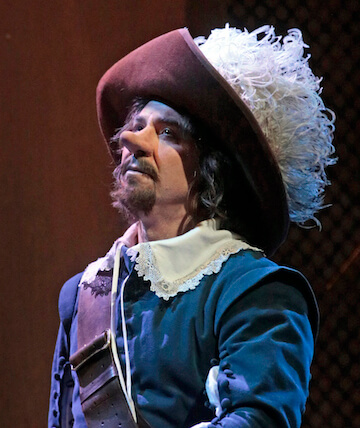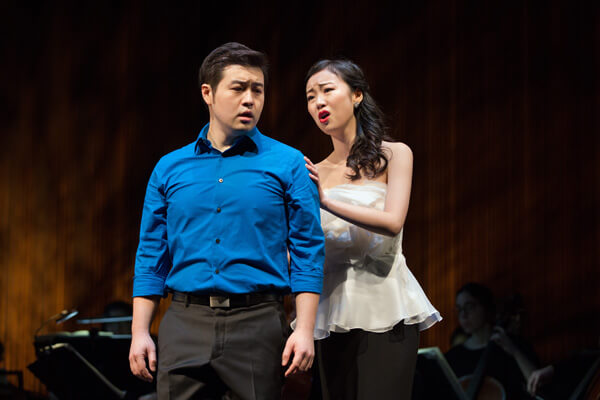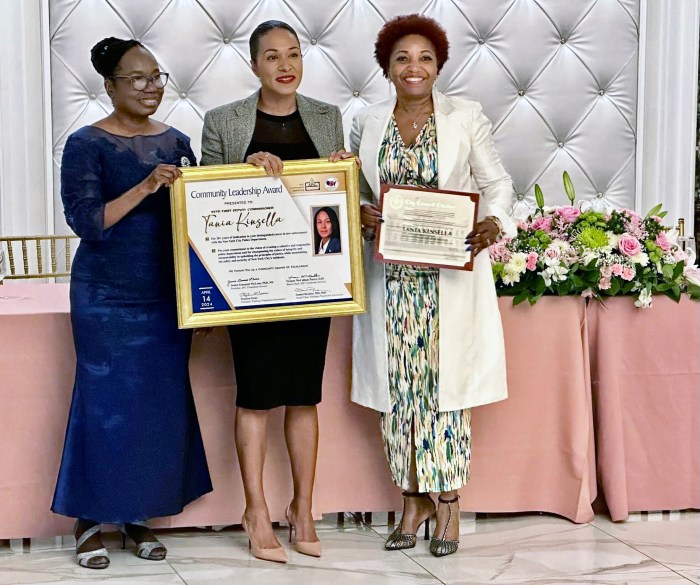Juilliard made a fantastic contribution to the opera season with Zack Winokur’s imagistically haunting, pitch-perfect staging of Francesco Cavalli’s 1651 “Calisto.” The work exemplifies opera’s second generation, in which what had been a restrained, literally aristocratic pastime went public — especially in the fun-house mirror of Venetian culture — and aimed for wider audiences with broader and bawdier plots and effects. Nymphs, shepherds, and divine beings or not, the libretto is entirely fueled by lust, deceit, and revenge. Not a noble thought or act gets aired — though the titular nymph and Endimione, the moony mortal lover of the “chaste” goddess Diana, whom Calisto follows, are principally victims.
The small Willson Theater housed Pilar Almon’s lovely bucolic-papered walls and screens designed by Charlap Hyman & Herrero. Two key elements prevailed in creating magic: Marcus Doshi’s lighting and Austin Scarlett’s sexy costumes — including a show-stopping, almost architectural but serpent-like gold dress for the vengeful Giunone that figured as a set element.
Some American conservatories seem to preparing musicians for the operatic repertory as it existed 50 years ago, but Juilliard, with its Historic Performance initiative, has been sterling about exposing both singers and instrumentalists to 17th and 18th century period style. On February 21, the small instrumental ensemble Juilliard415 played with great delicacy and point under the authoritative Stephen Stubbs. Not all the youthful vocalists had fully mastered the needed speech/ song fluidity and melismatic grace, but all showed rewarding stylistic awareness. And all benefitted from Winokur’s psychologically detailed direction and supple choreography, which left virtually no aspect of the text and subtext unexplored.
Juilliard stands out with “Calisto”; Met misfires on “Manon Lescaut”
As Diana and the randy Giove-impersonating-Diana, Samantha Hankey had the largest part and handled it with dramatic smarts and vocal aplomb. Gifted baritone Xiaomeng Zhang acted and sang with great effect as Giove himself, really relishing the text. Angela Vallone (Calisto) sang with compelling freshness and looked great consorting with both Hankey and Zhang. Jakub Józef Orlinski, dressed in as little as Scarlett could contrive, also looked wonderful as the punch-drunk Endimione. His musicianship proved impressive and his countertenor luminous — though sometimes imprecise of pitch in the lower reaches of his music. Matthew Swensen’s jealous Pan displayed a wonderfully promising, clear tenor; so did Alexander McKissick as the horny nymph Linfea, usually cast with a broken-down mezzo or ancient character tenor but here a handsome jeune premier with a gift for comedy. Caitlin Redding, sporting a pleasingly shiny mezzo, performed bravely and well as Linfea’s suitor, Satirino. Cody Quattlebaum (Silvano) and Michael St. Peter (Mercurio) also etched memorable characterizations. Julia Wolcott’s Giunone unfurled an imposing, not quite yet controlled dramatic soprano; she may follow Christine Goerke — Glimmerglass’ splendid 1996 Giunone — in becoming a mettlesome Elektra. Even before the first half of this triumphant staging had ended, I was wishing I could see it again.
The main thing making the Met’s new “Manon Lescaut” worthwhile February 15 was the lavish, expert conducting of Fabio Luisi. Puccini’s first major success gets better in each act, and the playing and pacing here were superb. Still, this was yet another poor co-production from yet another flashy but essentially traditional British director (Richard Eyre)! Seemingly the Brits like to remind us that Nazis occupied France — and not Britain; the 1941 Vichy setting here added nothing positive, just dramatically ludicrous moments when Nazi soldier extras failed to shoot straying characters dead. Rob Howell’s set brought forth yet another gratuitous huge staircase, the Met’s recent trademark. How can a management touting its own commitment to “Broadway theatricality” countenance endless, tension-killing scene changes in every new production? Act III’s usually moving expulsion of “fallen women” evoked “Gotta Have a Gimmick,” trashily distracting from the principals.
Would that those principals had been better! Roberto Alagna bravely jumped in for Jonas Kaufmann at short notice. Though in no way aristocratic, the French-born tenor remains plausibly sexy onstage and at least renders authentic Italianate phonetics. Save for some dismal high Bs and initial vocal scruffiness, he did better than on opening night transmissions. Alagna usually improves quickly during a run, and his blocking will surely grow less centered around the prompter’s visibility.
Kristine Opolais (Manon) looks like a TV star but again showed a voice lacking depth, color, warmth, or plushness; only softer middle register sounds emerged pleasant. Her Act IV aria’s more jagged music suited her approach best. Opolais acted a lot, rather manically and unsympathetically. Finally, there was insufficient chemistry between these two attractive professionals; this passion-imbued opera suffered without it.
Massimo Cavalletti followed up mediocre Met runs as Schaunard (2010), Marcello and Escamillo (2014) with a mediocre Lescaut, with pushed, inelegant singing. Is being tall and personable enough to get the third lead in a new production and an HD? Tall and less personable was debuting tenor Zach Borichevsky as Edmondo, a good cameo part for a rising talent (as Sean Panikkar showed last time the Met staged “Manon Lescaut”). Borichevsky’s passable voice isn’t notably attractive or distinctive and tends to narrow on top.
The evening’s only outstanding singing came from Brindley Sherratt (Geronte, portrayed as an imperious film director) and Andrew Bidlack (the Lamplighter, here sweeping streets), who ended his little song with superb diminuendo. What one would like to think of as “Metropolitan quality” extended to the brief but potently sung contributions of Brandon Cedel (Sergeant) and Richard Bernstein (Captain). The exciting Juilliard mezzo Virginia Verrez sang decently but not memorably as the chief Musician, a part in which smoothness of line is paramount.
David Shengold (shengold@yahoo.com) writes about opera for many venues.




























